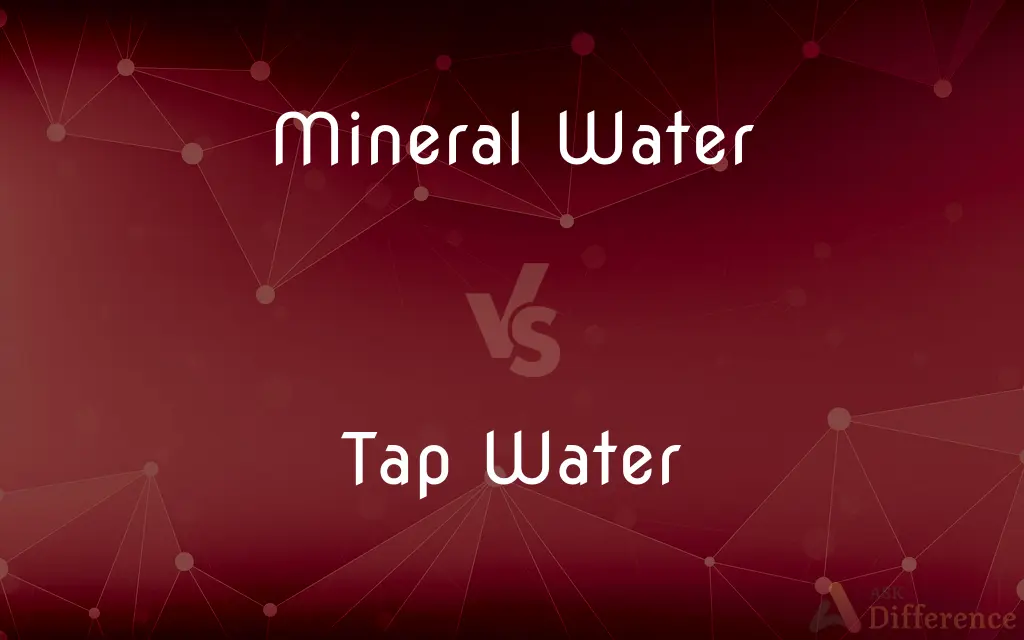Mineral Water vs. Tap Water — What's the Difference?
By Tayyaba Rehman & Urooj Arif — Published on February 14, 2024
Mineral Water is naturally sourced water with minerals and is often bottled, while Tap Water comes from municipal sources and is treated for safe consumption.

Difference Between Mineral Water and Tap Water
Table of Contents
ADVERTISEMENT
Key Differences
Mineral Water and Tap Water represent two primary sources of drinking water, each with distinct characteristics and benefits. Mineral Water is naturally sourced from mineral springs, where it acquires various minerals like calcium, magnesium, and potassium. These minerals can contribute to the water's taste and offer potential health benefits. Mineral Water is usually bottled at the source and often carbonated, making it a popular choice for those seeking natural mineral intake and a refreshing beverage.
Tap Water, on the other hand, is supplied by local municipal water systems and is treated to remove contaminants and pathogens, making it safe for consumption. The treatment process typically involves filtration, disinfection, and sometimes the addition of fluoride for dental health benefits. Tap Water is easily accessible in homes and buildings connected to the municipal supply and is subject to regular quality tests to ensure it meets safety standards.
The mineral content in Mineral Water can vary significantly depending on its source, contributing to a unique taste and composition. Some people prefer it for its natural mineral content, believing it to offer health benefits not found in Tap Water. Conversely, Tap Water's mineral content is usually lower and more controlled, with some municipalities adjusting the water's hardness or adding minerals for taste and health reasons.
Cost and environmental impact are also considerations when choosing between Mineral Water and Tap Water. Bottled Mineral Water can be more expensive than Tap Water and has a higher environmental footprint due to packaging and transportation. Tap Water, being readily available through the municipal supply, is cost-effective and has a lower environmental impact, especially when consumed using reusable containers.
In summary, the choice between Mineral Water and Tap Water often comes down to personal preference, with considerations for taste, mineral content, cost, and environmental impact. Both sources offer hydration, but they differ in their origin, treatment, and potential health benefits.
ADVERTISEMENT
Comparison Chart
Source
Natural springs
Municipal water systems
Mineral Content
Naturally occurring, varies by source
Controlled, may be adjusted by municipality
Treatment
Minimal, mainly filtration
Extensive, includes disinfection
Cost
Generally higher due to bottling
Lower, provided through municipal supply
Environmental Impact
Higher due to bottling and transportation
Lower, especially when using reusable containers
Compare with Definitions
Mineral Water
Sourced from underground reservoirs or springs.
This mineral water comes from a famous spring in the mountains.
Tap Water
Water provided by municipal systems, safe for drinking.
I fill my bottle with tap water before heading out for a jog.
Mineral Water
Bottled water containing natural minerals from springs.
I prefer mineral water for its natural taste and effervescence.
Tap Water
Convenient and cost-effective hydration option.
Tap water is my go-to choice for staying hydrated at home.
Mineral Water
Can vary in taste and mineral content based on its source.
Each brand of mineral water has a unique flavor due to its source.
Tap Water
May contain added fluoride to promote dental health.
The fluoride in our tap water helps to prevent cavities.
Mineral Water
Preferred by some for its perceived health benefits.
I drink mineral water for the extra magnesium and calcium.
Tap Water
Treated with chemicals to ensure safety and purity.
The city's tap water is treated with chlorine to kill bacteria.
Mineral Water
Often carbonated, providing a refreshing beverage option.
The carbonation in mineral water makes it my favorite drink with dinner.
Tap Water
Subject to government regulations for quality and safety.
Our tap water meets all the EPA's safety standards.
Common Curiosities
How do I know if my Tap Water is safe to drink?
Check the annual water quality report from your local water provider.
Can I drink Tap Water every day?
Yes, if it meets safety standards set by health authorities.
Can Mineral Water help with mineral deficiencies?
It can contribute to mineral intake, but shouldn't replace a balanced diet.
Does boiling Tap Water remove all contaminants?
Boiling can kill bacteria but doesn't remove chemical contaminants.
How can I improve the taste of my Tap Water?
Using a water filter can improve taste by removing chlorine and other elements.
Is bottled Mineral Water environmentally friendly?
The bottling and transportation increase its environmental footprint.
Are there regulations for Mineral Water quality?
Yes, bottled water, including Mineral Water, must meet specific quality standards.
Is Mineral Water always carbonated?
Not always, but it's commonly found in carbonated form.
Is Fluoride in Tap Water harmful?
Fluoride is added in safe amounts to promote dental health.
Is Mineral Water safer than Tap Water?
Both are generally safe, but Mineral Water is naturally purified and contains minerals.
Do all Mineral Waters come from natural springs?
Most do, but some may undergo additional treatment or mineral addition.
Does Tap Water taste differ by location?
Yes, due to varying mineral content and treatment processes.
How often should I test my Tap Water?
If you're concerned about contamination, consider annual testing.
Can I refill bottled Mineral Water with Tap Water?
Yes, but ensure the bottle is clean to avoid bacterial growth.
What's the cost difference between Mineral Water and Tap Water?
Mineral Water is generally more expensive due to packaging and branding.
Share Your Discovery

Previous Comparison
.40 S&W vs. 9mm
Next Comparison
Netflix vs. Prime VideoAuthor Spotlight
Written by
Tayyaba RehmanTayyaba Rehman is a distinguished writer, currently serving as a primary contributor to askdifference.com. As a researcher in semantics and etymology, Tayyaba's passion for the complexity of languages and their distinctions has found a perfect home on the platform. Tayyaba delves into the intricacies of language, distinguishing between commonly confused words and phrases, thereby providing clarity for readers worldwide.
Co-written by
Urooj ArifUrooj is a skilled content writer at Ask Difference, known for her exceptional ability to simplify complex topics into engaging and informative content. With a passion for research and a flair for clear, concise writing, she consistently delivers articles that resonate with our diverse audience.













































